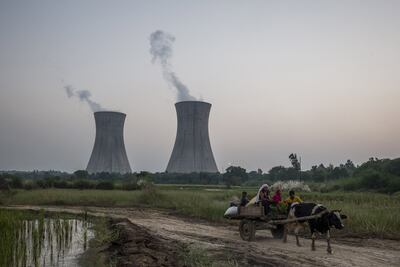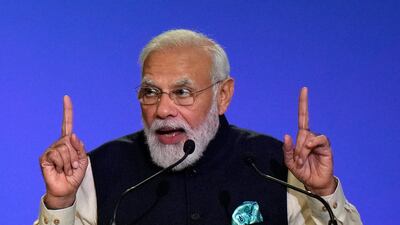India has set a target of becoming carbon neutral by 2070, Prime Minister Narendra Modi told the Cop26 climate change summit on Monday.
By 2030, India will expand its clean energy sector, obtain half its power from renewable resources and cut carbon emissions by one billion tonnes, he said.
But the 2070 net-zero deadline is notably later than other major polluters. China is aiming for 2060, and the UK, US and EU have set a target of 2050.
Mr Modi defended India’s policies and said the country was sticking to its pledges “in spirit and letter”.
He called for a global push to adopt sustainable lifestyles in place of “mindless and destructive consumption”.
India has proved a tricky player in global climate talks after evading calls to wind down its coal sector.
On Sunday, it put its name a G20 communique that disappointed activists by merely promising carbon neutrality “by or around mid-century”.
Mr Modi told the heads of state gathered at Cop26 that rich nations needed to carry more of the burden.
“It is India’s expectation that the world’s developed nations make $1 trillion available as climate finance as soon as possible,” he said in Glasgow.
“Justice would demand that those nations that have not kept their climate commitments should be pressured.”

Apologising for running over the time allocated for his speech during a packed Cop26 schedule, Mr Modi said it was "my duty to raise my voice for developing countries".
“India is the only big economy in the world that has delivered in both letter and spirit on its Paris commitments,” he said.
He highlighted previous moves to increase India’s clean energy share and decarbonise the Indian railway system.
The country will increase its non-fossil fuel capacity to 500 gigawatts by 2030, Mr Modi said, upgrading a previous target of 450.
He said half of India’s electricity would come from renewable sources by the same date.
In addition, he committed to reducing India’s carbon intensity – a measure of the carbon emissions produced for every dollar of gross domestic product – by 45 per cent.
Steering the world away from coal, which is considered the dirtiest fossil fuel, is central to the UK's ambitions at the conference.
Cop26 President Alok Sharma has described the talks as the moment when “coal power should be consigned to history”.
But G20 countries have failed to agree on a timetable for phasing it out.
India is not the only dissenter. Japan and Australia believe high-efficiency coal-fired energy plants should be treated as clean enough to receive green funding.


